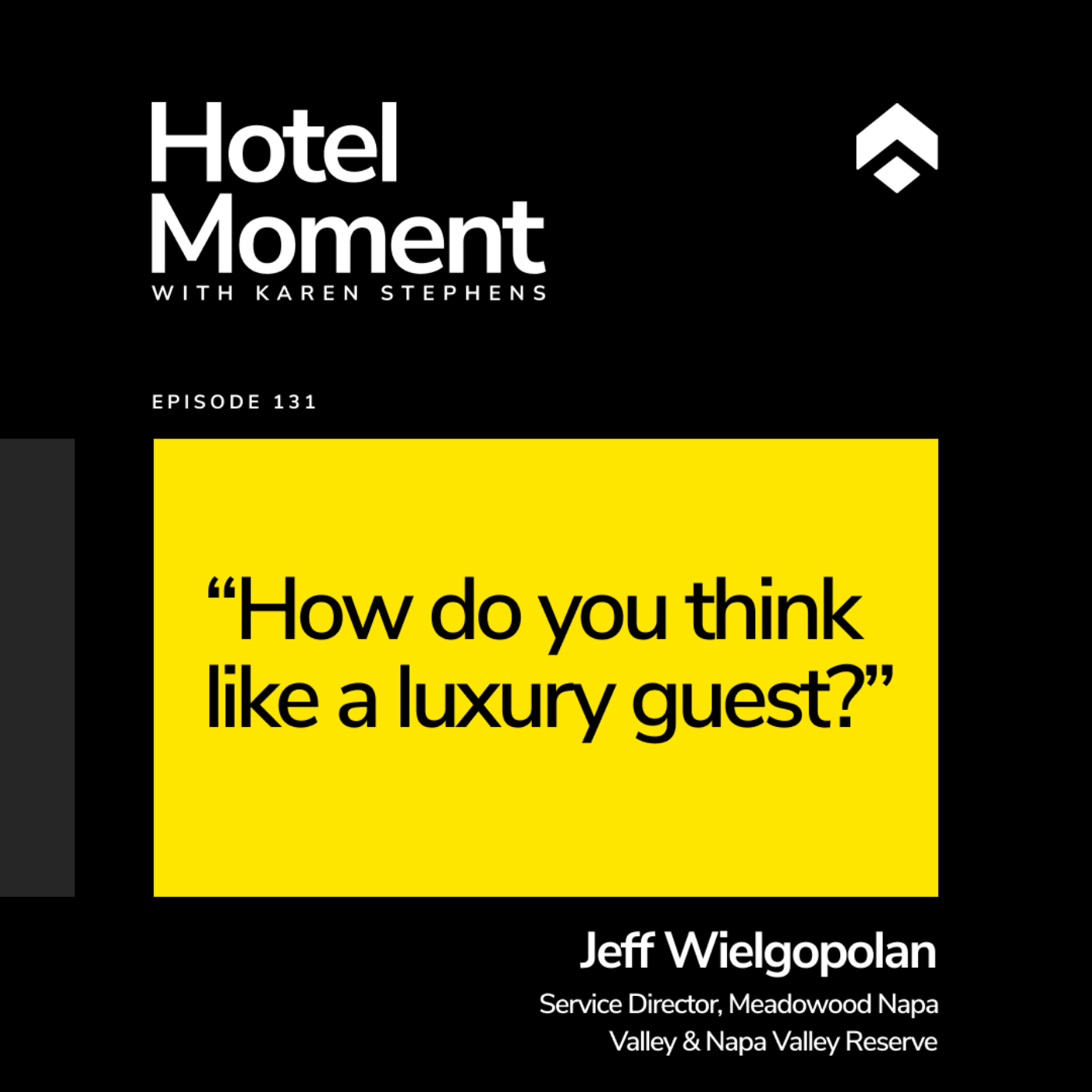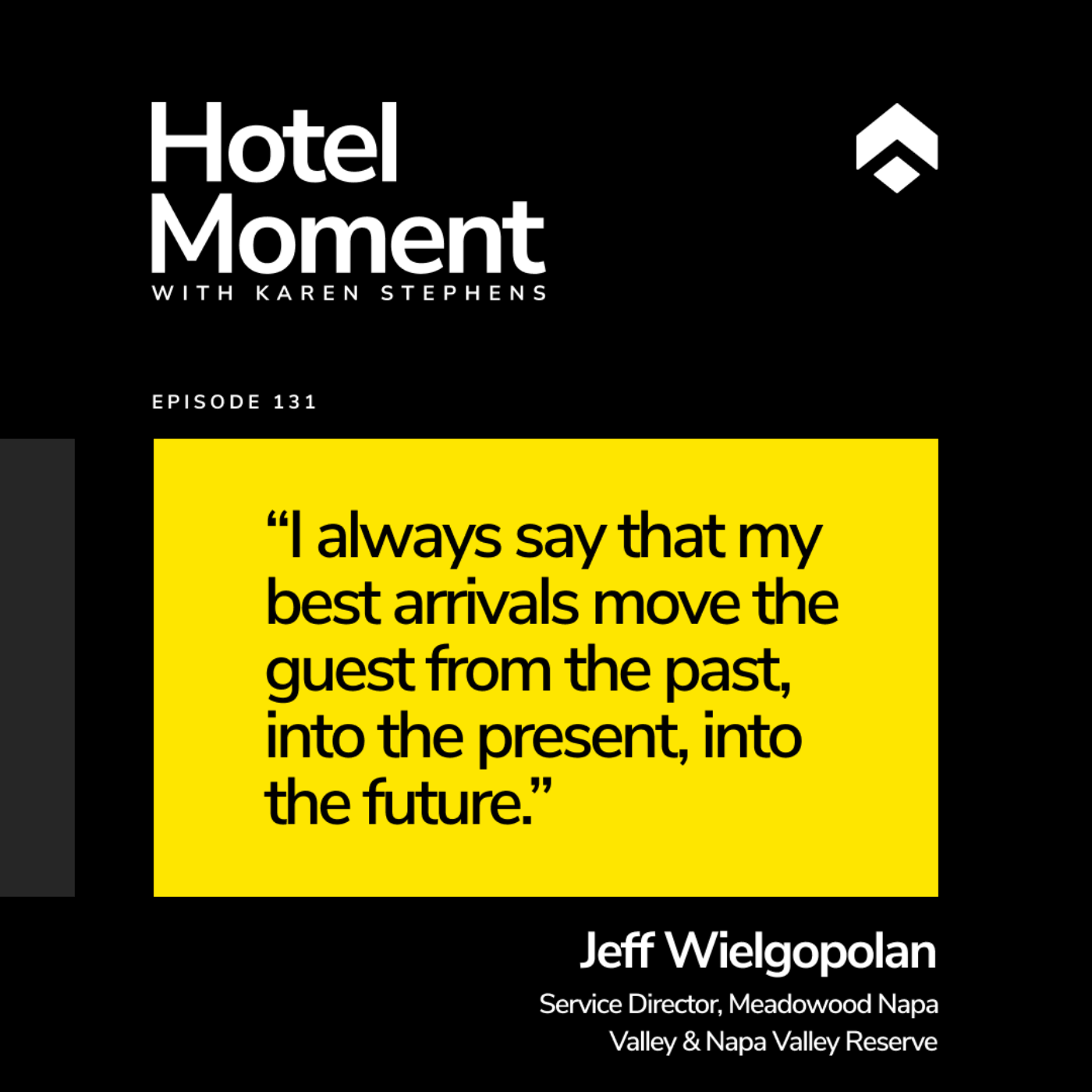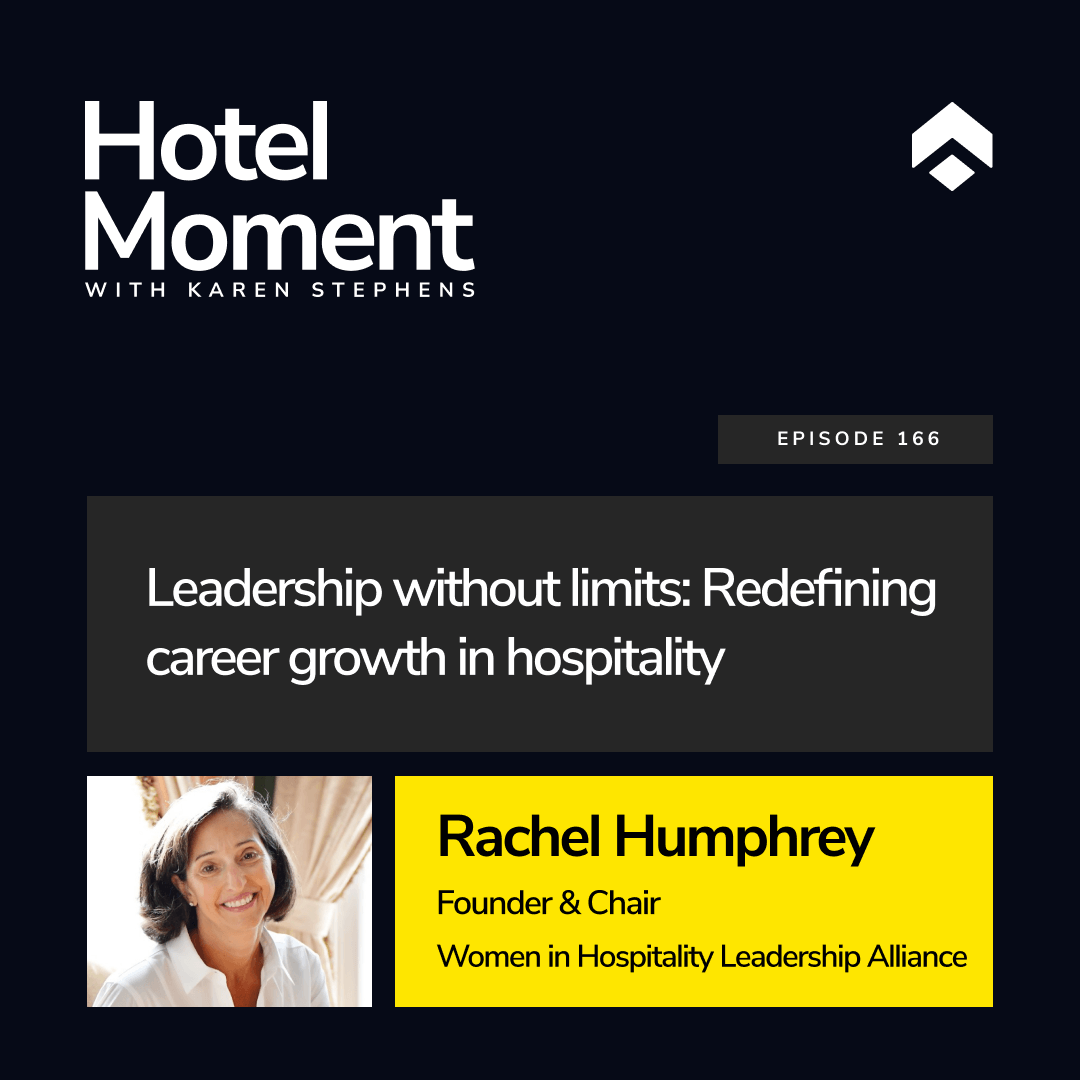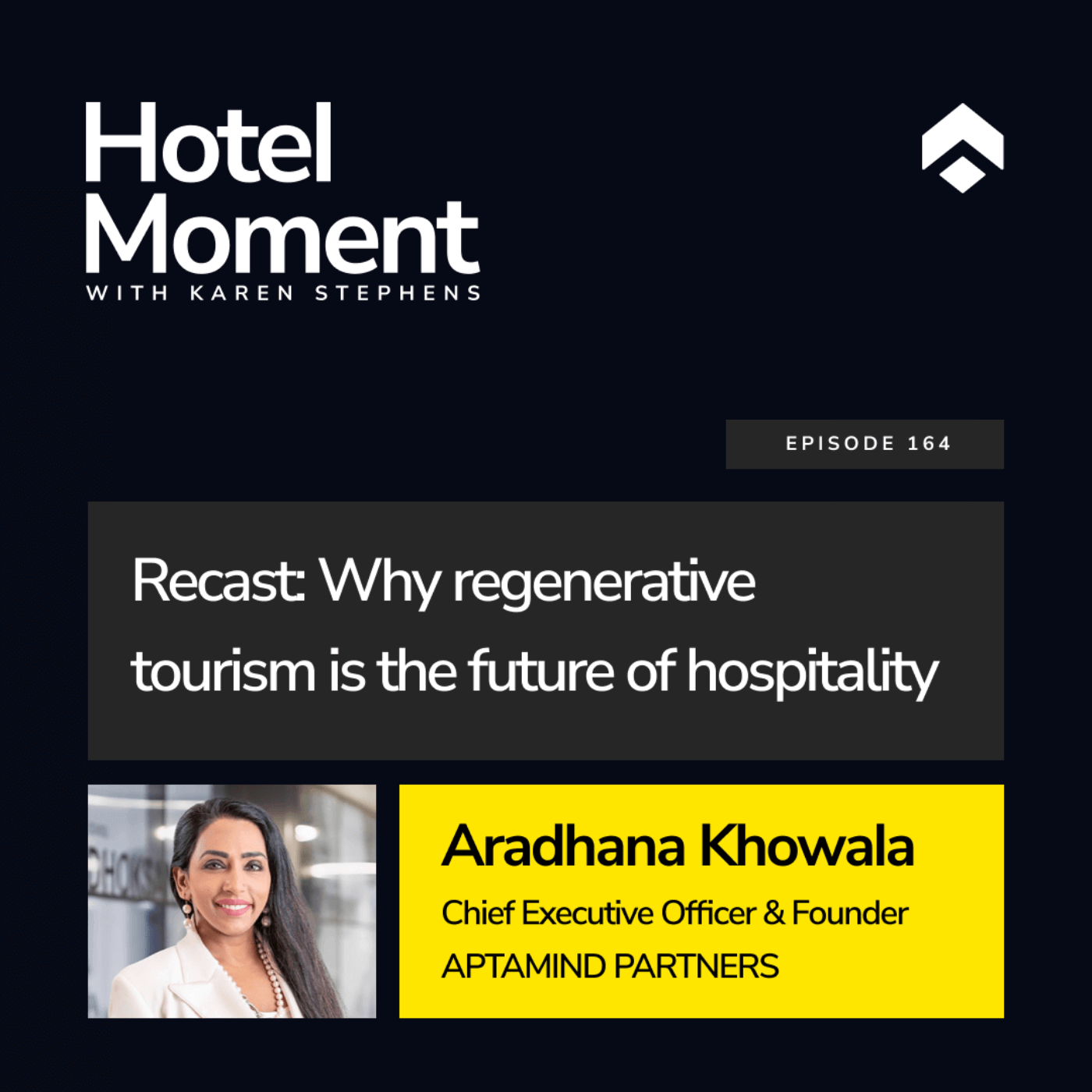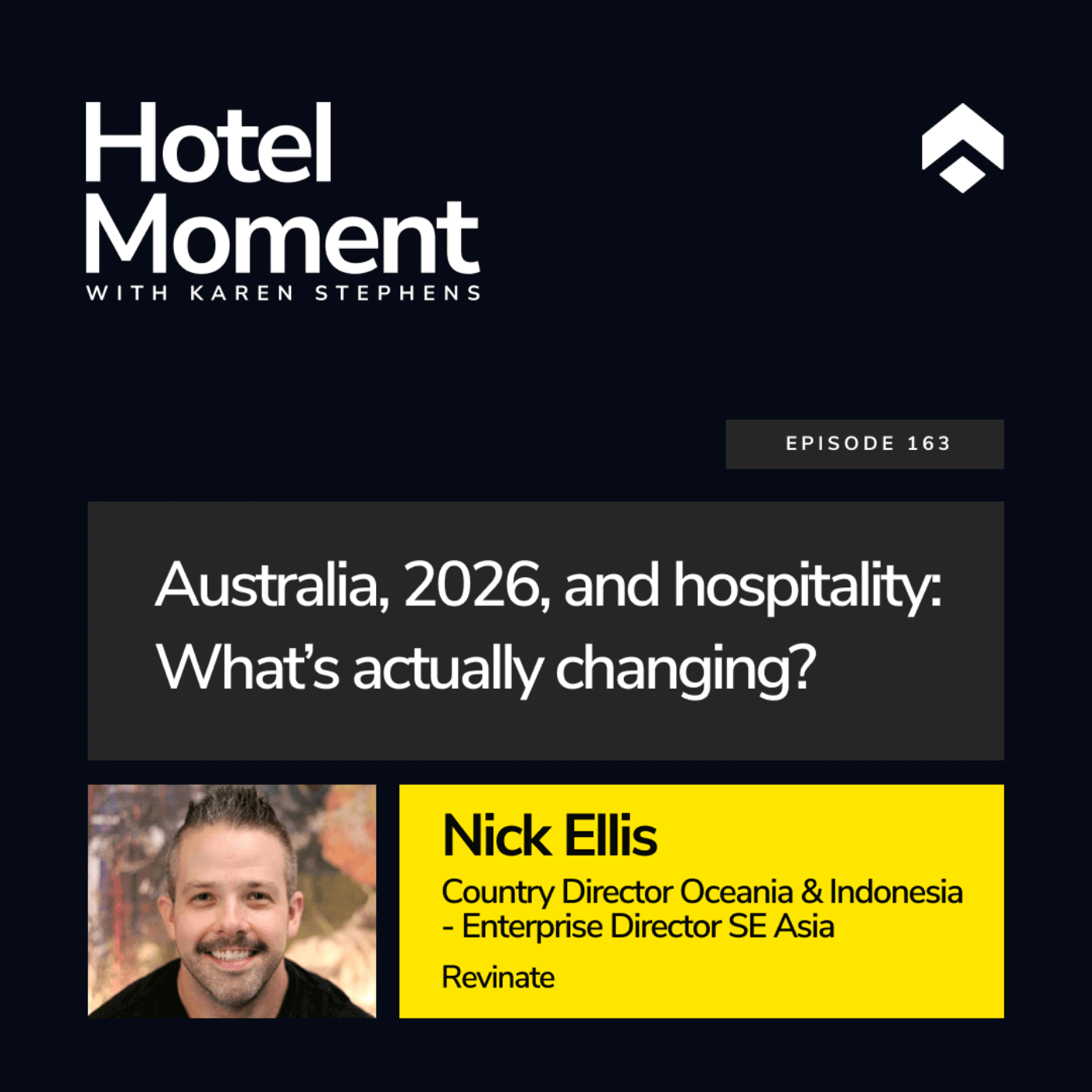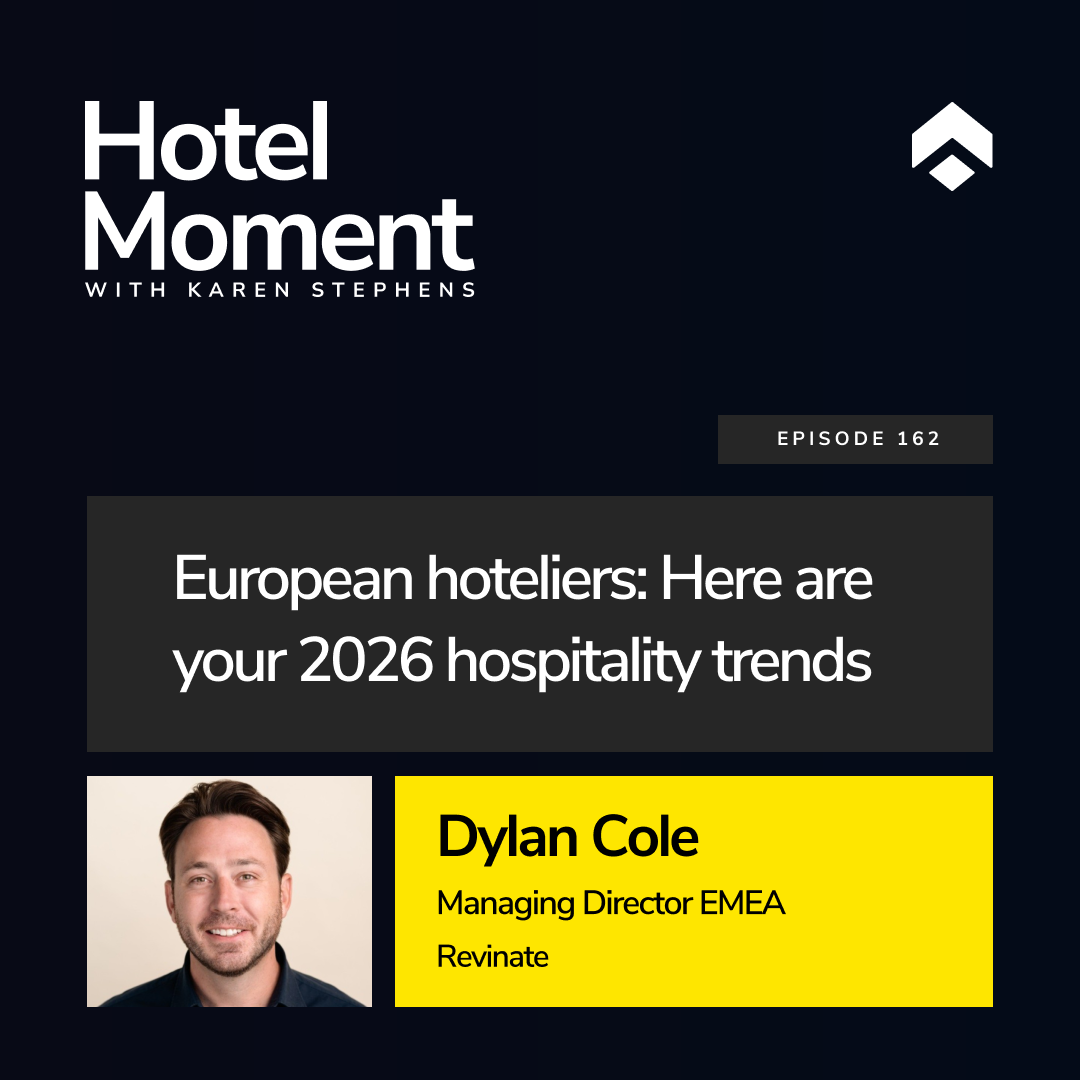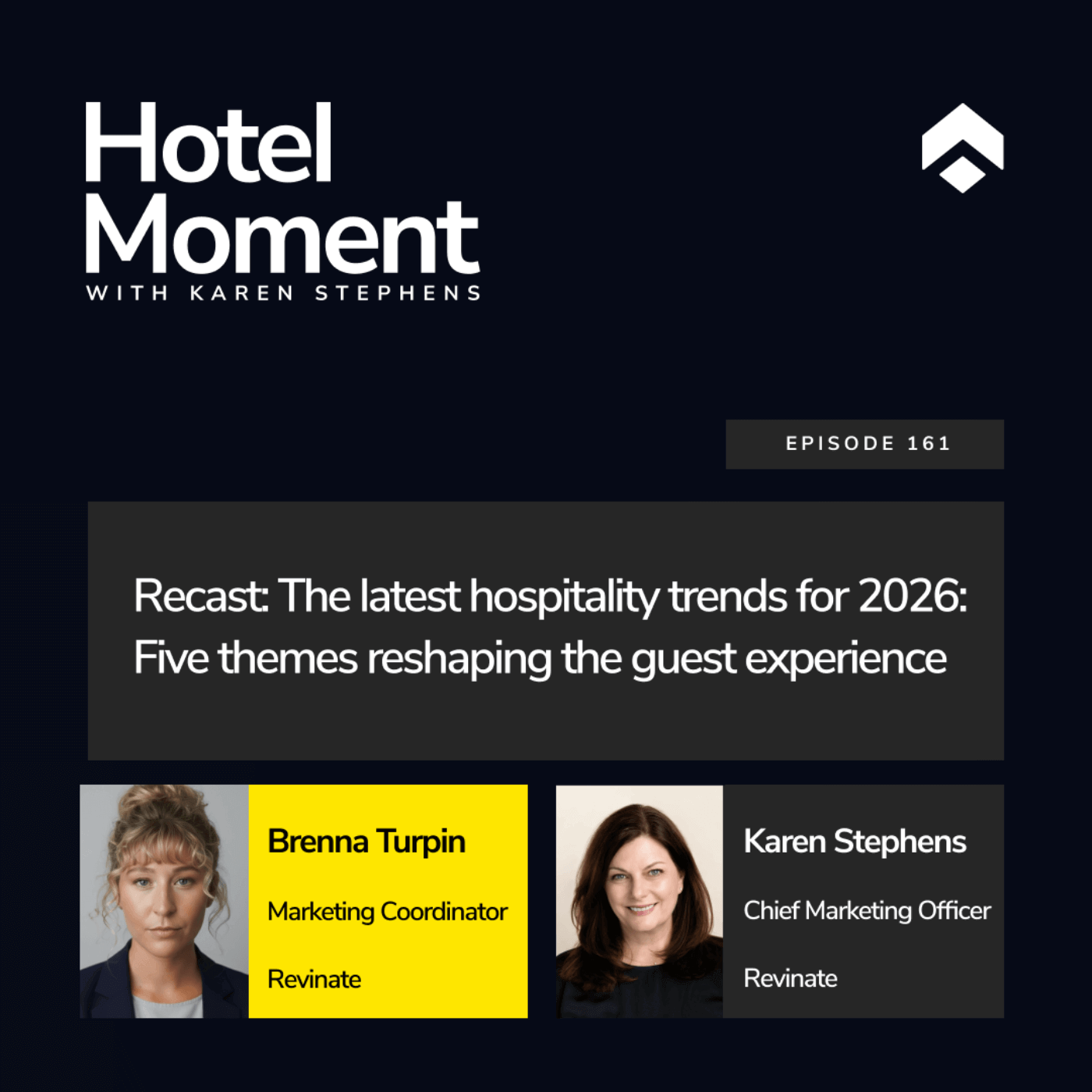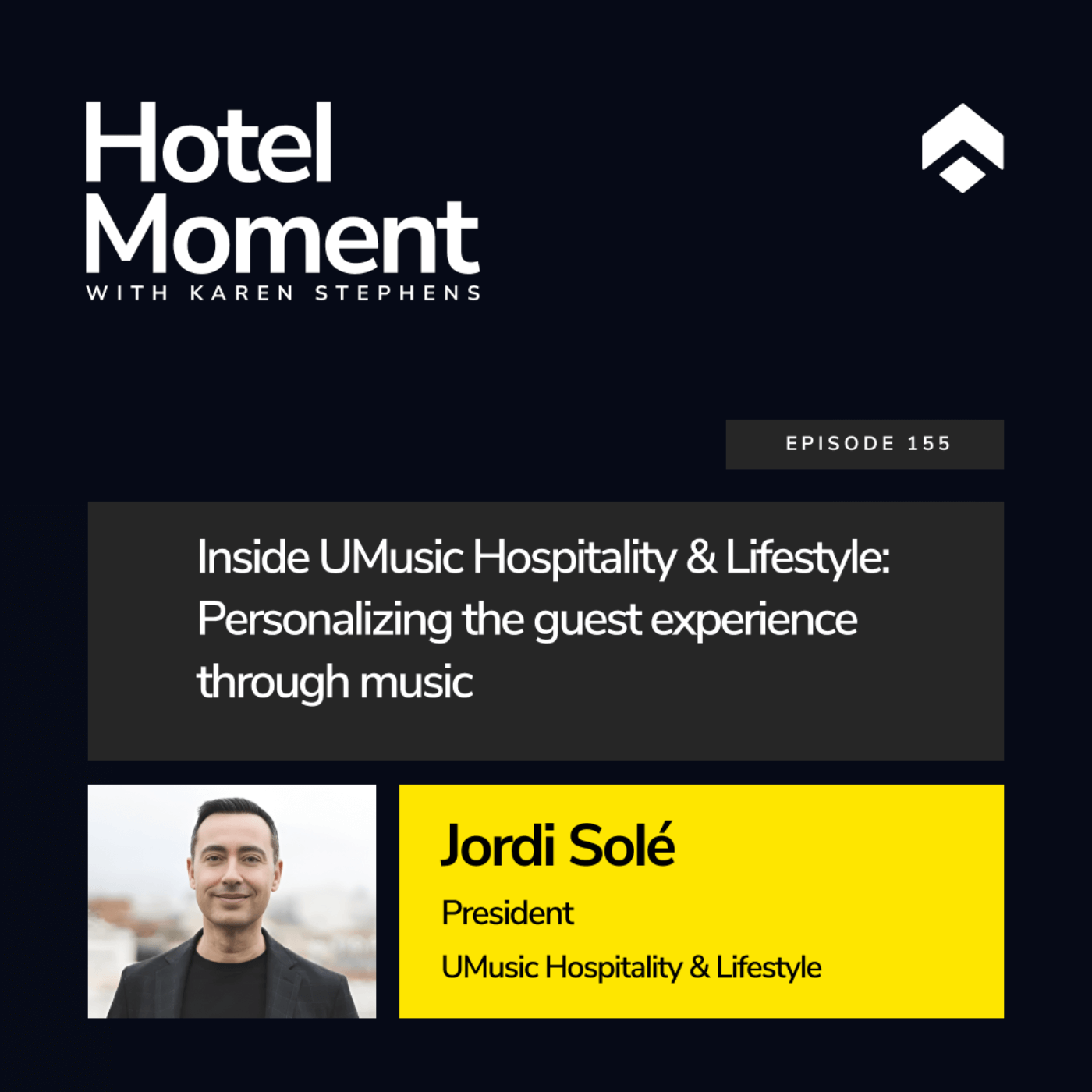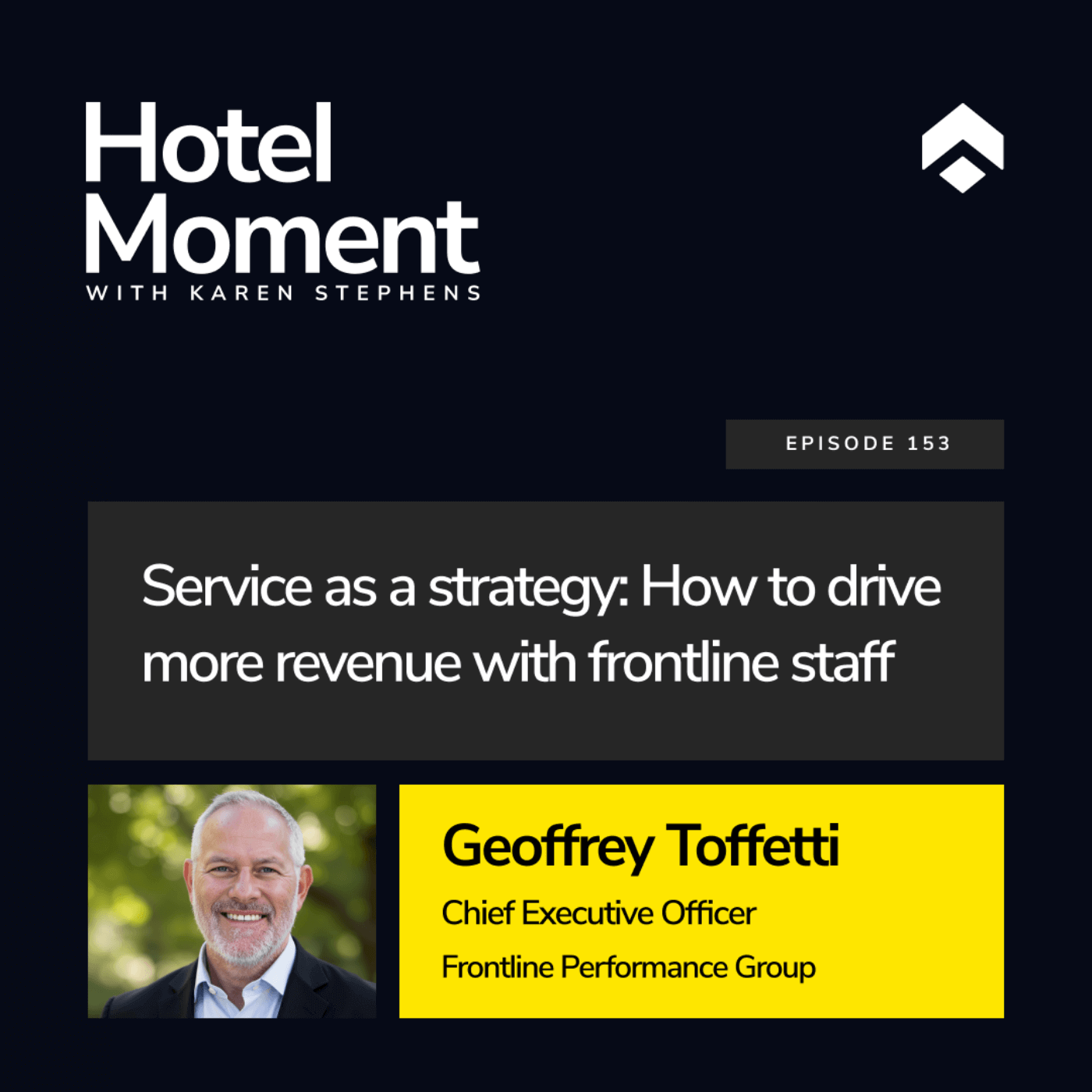Hotel Moment
WITH KAREN STEPHENS


Episode 131
Delivering world-class service: Lessons in global luxury hospitality
In this week’s episode of Hotel Moment, Jeff Wielgopolan, Service Director of Meadwood Napa Valley & The Napa Valley Reserve, joins Revinate CMO Karen Stephens to share a guiding philosophy that ensures your hotel stands the test of time: To enjoy a luxury experience, all guests should have to do is show up and pay.
Jeff explains how the training and treatment of hotel staff weave through this philosophy, and how well-treated staff lead to well-treated guests who have their needs taken care of intuitively.
You’ll hear how Jeff recommends hoteliers incorporate guest feedback into the guest experience and stresses why it’s important for staff to balance personalization with the “why” behind every interaction.
Tune in to discover how to use technology to meet your guests where they are and deliver luxury experiences at scale.
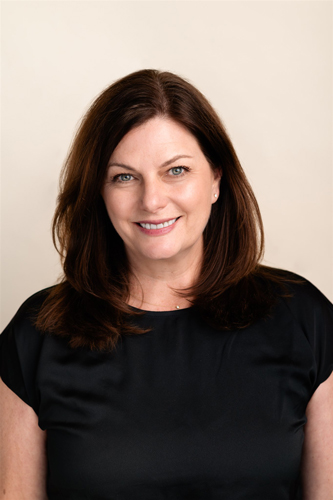
Meet your host
Karen Stephens
As Chief Marketing Officer at Revinate, Karen is focused on driving long-term growth by building Revinate’s brand equity, product marketing, and customer acquisition strategies. Her deep connections with hospitality industry leaders play a key role in crafting strategic partnerships. Karen has more than 25 years of expertise in global hospitality technology and online distribution — including managing global accounts in travel and hospitality organizations such as Travelocity and lastminute.com
As the host of The Hotel Moment podcast, she interviews top players in the hospitality industry. Karen has been with Revinate for over 11 years, leading our global GTM teams. Her most recent transition was from Chief Revenue Officer, where she led the team in their highest booking quarter to date in Q4 2023.
Watch the video
Transcript
Jeff Wielgopolan – 00:00:00: Luxury is the ability to not have to think. And I think that’s the greatest luxury that you can give somebody, that, from a guest perspective, that all you should have to do is show up and pay. And that’s it.
Intro- 00:00:16: Welcome to the Hotel Moment Podcast presented by Revinate, the podcast where we discuss how hotel technology shapes every moment of the hotelier’s experience. Tune in as we explore the cutting-edge technology transforming the hospitality industry and hear from experts and visionaries shaping the future of guest experiences. Whether you’re a hotelier or a tech enthusiast, you’re in the right place. Let’s dive in and discover how we can elevate the art of hospitality together.
Karen Stephens – 00:00:45: Hello and welcome to the Hotel Moment Podcast. I’m your host, Karen Stephens, the Chief Marketing Officer of Revinate. And today we’re excited to speak with Jeff Wielgopolan, an esteemed leader in the hospitality industry with over 20 years of experience in service excellence and luxury hospitality. As the Service Director at Meadowood Napa Valley, a Forbes Travel Guide five-star hotel and spa, Jeff oversees the creation of unforgettable experiences at one of the most renowned luxury destinations. Previously, Jeff served as the Global Senior Vice President of Learning and Development at Forbes Travel Guide, where he worked with luxury hotels and resorts globally to improve their service levels. Jeff’s unique perspective comes from his extensive background in fine dining, his work with prestigious brands, and his unwavering commitment to mentoring the next generation of hospitality leaders. So without further ado, here’s Jeff. Welcome to the podcast, Jeff. It’s a pleasure to have you here.
Jeff Wielgopolan – 00:01:41: Thank you, Karen. It is great to be here with you today.
Karen Stephens – 00:01:43: So I’d love to start with just talking a little bit about Meadowood. So Meadowood was one of the very first customers for Revinate, fun fact, all the way back to 2009. So we started with our guest feedback product there. Now we have a long history together. But just for our listeners who are not familiar with that beautiful property, can you tell us a little bit about the resort and the history?
Jeff Wielgopolan – 00:02:04: Absolutely. So Meadowood Napa Valley has been part of the wine growing community since the early 1960s, when it actually started as the Meadowood Country Club. And it was purchased in 1979 by our current owner, Mr. Bill Harlan, and who slowly actually turned it from a country club into a hotel, into a resort. Started with seven rooms, and we currently have 36 spread out over 250 acres. What makes it pretty unique is that it’s located inside of a valley, within a valley. So it’s incredibly quiet and private and exclusive. And we have an amazing five-star spa, three pools, two great restaurants. But what also makes it pretty unique is that it’s been, once again, the center of the wine growing community. So sort of the goal is that you may be swimming laps next to the winery owner that you visited earlier that day. So it’s really unique and provides guests with sort of a very interesting and great access to the local community.
Karen Stephens – 00:03:06: It’s really an incredible property. I think for anybody who hasn’t been there, what a treat. Kind of the vacation of a lifetime, if you think about the experiences you have there. And your role on the property is quite unique because you’re in charge of that guest experience. So you’re the service director. Can you just talk a little bit about the scope of what you do there? And then I’d love to jump in a little bit more into your background that led you there. But let’s start with what you’re doing today for Meadowood.
Jeff Wielgopolan – 00:03:29: Absolutely. So as service director, I basically oversee our guest experience here at Meadowood. And what that entails is wide reaching. So whether that is training all of the staff to make sure that they’re adhering to all of our internal standards and all of our expectations to communicating to all of our guests host stay on all of the feedback in which they provide, certainly from their revenue surveys and working a lot with guests and our staff quick arrival to make sure that the guest is set up for success to their on-property stay. So I basically am involved in every department on property. Just make sure that each area is delivering our sort of our meadowed magic and the experience in which we aim to provide to our guests.
Karen Stephens – 00:04:15: That’s perfect. And Jeff, you have a vast experience within luxury hospitality. So this is not your first rodeo. So can you tell us about what initially drew you into the world of service excellence in luxury hotels? How did you get there?
Jeff Wielgopolan – 00:04:29: So I guess, well, two parts. I think that what drove me to Meadowood was actually when I was working with Forbes Travel Guide. I had an opportunity to actually train here at Meadowood back in 2017. And I had a dinner with Bill Harlan, our owner. I remember sitting at Mustard’s Grill and he asked me a question that no one had ever asked me before. And I had traveled to hundreds of hotels and met hundreds of owners and executives and general managers. But he asked me, he said, Jeff, you know hotels. What does a guest room look like 40 years from now? And I remember thinking, well, first I had to come up with an answer. So there’s that. And then the second part was, oh, this is actually really interesting. You think of hotels like a bottle of wine and you think of hospitality the same way. That you’re not just looking to get an investment out of it immediately. But just like wine, you have to figure out how to make it taste good today and in five years and in 10 years and in 40 years. So what an interesting take on, I guess, from an owner on hospitality that you’re thinking about it actually generationally. Of how do we build a hotel room today that’s so timeless that it stands the test of time for 40 years? How do we set up our mission and our vision that collectively this will carry through into the next generation of team members and the one after that? And we actually had our employee recognition ceremony yesterday. And something that Mr. Carlin does is that he asks everybody to stand up and then sit down at five years, at 10 years. And the amount of people that have been here, 20, 25, 30, 35 years is astounding. So it’s really great to be part of a culture that, once again, the longevity of it is sort of what keeps people here. With regards to how I got into this business, I’ve been involved in food and beverage and hospitality my whole life. Went to the Cornell Hotel School, graduated, worked for Four Seasons, worked for Lettuce Entertain You. I was the dining room director of a Relais & Châteaux four-star restaurant in downtown Chicago and had heard about this crazy little company called Mobile Travel Guide that raided hotels and restaurants at the time. And cold called them, applied and got the job as the senior manager of quality assurance for restaurants. And so my job at the time was to, which is going to sound insane, but fly to a city. So I would fly from Chicago to San Francisco and I would check in at probably the dumpiest hotel I could find that I would say that I would feel safe in. And I would just quite literally eat my way through the city. I would have like lunch, lunch, and then a fine dining dinner inspection. And then wake up in the morning and have breakfast, breakfast, lunch, lunch, lunch, fine dining dinner inspection. Wednesday morning, breakfast, breakfast, lunch, lunch. And you didn’t need a whole meal at breakfast and lunch. You just needed, you were just writing a paragraph for the book that we had published at the time. So doing a little bit more of a facility inspection. Come home, eat salad for a week, and then pay back on the road the following week. And it was really fascinating because I got to learn sort of how a nation actually eats and how restaurant trends and how restaurant service moves from one place to the country to another. And so through that, got a good deep dive into fine dining. And then back in 2007, Mobile Travel Guide was purchased by a gentleman named Jeff Arnold, who still owns it today. And basically thought, so Jeff, you fly to San Francisco to eat at a restaurant. And Karen, you fly to San Francisco to stay at the hotel. Why doesn’t everybody do everything? So all of our jobs were eliminated. And then we all became hotel, restaurant, spa inspectors. So I always joke, if you ever wanted to know what a secret hotel inspector looks like, it was a good example of one. And then my former colleague, Amanda Frazier, and I basically thought one day of, isn’t it kind of crazy that we put all of this information into a computer and then it dies and it goes nowhere? Like we’re having all of these great experiences. So we founded a training division where we would work directly with hotels and restaurants and spas to help them understand, well, what is this crazy concept of five-star service? Or how do you execute it? How do you think like a luxury guest? And build that up into what it is today. And it’s really rewarding to actually see it continue to grow on the Forbes Travel Guide side. So it’s been quite a ride.
Karen Stephens – 00:09:12: Yes, it’s a great ride. And we just had Stuart from Forbes Travel Guide, was just my guest a couple of weeks ago on the podcast. And he also came to our Navigate in Austin. And I can tell you, we’re very fortunate at Revinate to have some beautiful groups and hotels that are part of our customer base. And all of them aspire to not only gain, but maintain the Forbes Travel Guide rating. So congrats on being part of that building out. And obviously you have the clout to do that with what you’re delivering now for Meadowood. So one thing I wanted to pick up on when you were talking about the employee recognition, because I think a lot about this with guest service, you talk about the longevity of the employees there. And one thing we’ve been talking about lately on this show is how much the employee experience drives the guest experience. So can you just talk to me? Because I think it’s kind of where at this interesting time, it’s an influx of how do you work with technology, with AI, and with people. But can you just talk a little bit about your take on that employee experience driving guest experience?
Jeff Wielgopolan – 00:10:15: I think that one of my main goals here, and I think that we did a fantastic job and we were just able to even build on that when I started, is that there really should be no difference between the front and the back of the house. That the way in which we treat our employees should be the same way in which we treat our guests and vice versa. Same way we treat our guests, the same way in which we treat our employees. That from an employee standpoint, it’s almost impossible to just turn your brain on and off. And so what we mean by that is we are walking through property or we’re on our golf carts that we say hello to every single person that we see. We stop what we’re doing, we wave hello and we say good morning, good afternoon. Whether that’s a guest or a staff member, whether when you walk into a room, you greet everybody. So it’s one of those things that it sounds like it’s really simple, but it’s amazing the power that it has that every employee is acknowledged by their leader, by a manager, and everybody is noticed and seen. And one of the other things that we do is that when we get guests feedback, it’s really easy to reward all of the staff members who are mentioned in a Revinate survey, who are front facing, but what are guests right about. But at the same time, that sort of alienates all of the other people that contribute that really don’t have that much guest experience. Or they contribute in a very different way that the guest is never going to respond to. Like, you’re never going to write in your post-it survey that thank you for all of the clean glassware and the clean silverware and the clean sheets. Much appreciated. You’re never going to write that. You’ll let us know when the glasses were dirty or when the silverware is dirty or your sheets were stained, but you’re never going to compliment us on the fact that they were clean. So we sort of have to take all of those things that, okay, like sometimes the absence of the comments, we have to go back to those team members and say, like, hey, great job. Like, awesome. That what we are providing our guests is of excellent quality and make sure that all the team members in the back of the house, from the dishwashers and the stewards to laundry, are also getting the same recognition as the team members in the front of the house. So sometimes when you have employee initiatives and employees of the quarter or you’re giving like rewards or gift cards, if your name is mentioned in a survey, I think just be mindful of what you’re doing is you’re also telling 50 to 60 percent of the hotel that they’re never going to get it because they don’t have that interaction with the guest. And all of a sudden you start to create a culture that like, oh, only these people matter because they’re in the front of the house and everybody contributes and everybody needs to feel once again for their contributions to feel seen.
Karen Stephens – 00:12:55: Absolutely. So I understand that you’ve talked about luxury. You’ve defined it as multi-definitional. Is that the right word for it?
Jeff Wielgopolan – 00:13:02: I mean, a little bit. I think that the way I would always like to think about luxury is that luxury is the ability to not have to think. And I think that’s the greatest luxury that you can give somebody that from a guest perspective, that all you should have to do is show up and pay. And that’s it. So if you think about like the moments of your life, when you really like something and you really start to digest why it works or why you like it, it’s probably because you were just able to enjoy it in a really simple way. And a five-star hotel does not own luxury service. You can get great service anywhere. You can get great service from a diner. And like, what is it? It’s probably that you didn’t have to raise your hand. Everything was just speedy. It tasted good. It was accurate. It was clean. It was friendly. So if you start taking all those concepts and you put it into a five-star hotel, and now you’re paying $25 for an omelet and $8 for a cup of coffee, yes, your expectations are much higher. But at the baseline level, if you have to ask for more coffee, it’s almost unacceptable. So what we have to do as a team and what we have to do as an industry is make sure that you don’t have to think that we have thought every step ahead of you and a few more. So that way you can just enjoy it. Right?
Karen Stephens – 00:14:19: Absolutely. And let me ask you, so we’ve obviously talked about the employees who understand the importance of service and they feel rewarded for that and recognized for that. How do you marry that with technology to hyper-personalize or to make sure like, I’m sure you have a high percentage of repeat guests that come onto property. So how do you manage that so that there’s, is there something going on behind the scenes that makes it easier for the employees to hyper-personalize or what’s your approach there?
Jeff Wielgopolan – 00:14:43: There’s a lot of communication, that’s for sure. From a daily meeting to a VIP report, and the VIP report internally is not just who we deem as a quote unquote important people, but it’s anybody celebrating an anniversary, anybody celebrating a birthday or a special occasion. So that way everybody on property can say congratulations, happy anniversary, whatever it may be. We have a lot of people that come here to Napa Valley, not just for anniversaries and birthdays, but to celebrate that they are cancer free, to celebrate a new beginning of life, et cetera. So just making sure that everybody on staff is aware. From a technology standpoint, we have certainly a lot of systems that we use from reservations to all how the concierge will send you your itinerary. Admittedly, we try actually not to incorporate a lot of technology on the guest side, that we really wanted to make sure that the guest feels connected to nature, that we don’t want them on their phone. We want them in their room, not looking at an iPad or a tablet, that we really want them to feel connected to the space. So we try and make sure that all the technology is on the employee side. So that way the guests can actually just enjoy themselves on property.
Karen Stephens – 00:16:00: That’s wonderful. That’s another thing that we’re hearing. It’s interesting when you see kind of the trends out there. We had a lot of conversations that navigate about putting down devices and getting into nature. So that’s great at all levels. It was AutoCamp who was talking about that specifically, which is definitely a different product from a Meadowood. But I think the consumer want and need is the same, which is we all want that detachment and we all want that seamless experience without all the tech necessarily when you’re doing that.
Jeff Wielgopolan – 00:16:28: From years of being on the road, I also think that technology just has to fit the brand. It has to fit the hotel and it also has to be location specific. I would always remember that if I was a single traveler going to Boston or Chicago and having to order a club sandwich or an iced tea over a tablet or an app on your phone, it’s like, okay, I can do that. That’s pretty simple. Now order in-room dining for your family of five. And you have to customize this order. And this kid wants apples instead of French fries. And this kid wants extra French fries. And this person’s allergic to gluten, et cetera. And now you’re spending 20 minutes typing in your order. And that’s not vacation. That’s work now. And so what worked in one place doesn’t work in another. So it’s just the ability for us as an industry to be nimble, to provide the guests the choice of do they want to use technology or do they not? But the idea that it’s all one size fits all, I think, is ridiculous.
Karen Stephens – 00:17:22: It’s crazy. You have to meet the guests where they are. If you want to pick up the phone and call is great. If you want to grab somebody in the lobby and tell them you’re going to need an order, great.
Jeff Wielgopolan – 00:17:30: Yes, right. Exactly. The guests will tell you what it is that they want. They’re really good at it.
Karen Stephens – 00:17:37: That’s awesome. So you’ve worked in learning and development, as we talked about, we’ve learned for Forbes. So as someone who has that background, how do you approach staff training in a way that ensures that every team member consistently delivers the type of personalized, high quality service that we’re talking about here?
Jeff Wielgopolan – 00:17:52: So I’ll maybe give a long answer to this, but when we first started training at Forbes Travel Guide, we would put people in a room and go standard by standard and explain what it was. And these were admittedly eye-gougingly boring presentations.
Karen Stephens – 00:18:09: How many standards are we talking here?
Jeff Wielgopolan – 00:18:12: I mean, hundreds. And we would basically lock all of the rooms division in a room for four hours. And you always felt so bad for the reservations team who went first. And then it just has to sit for three hours, three and a half hours, listening to everybody else. But, we quickly realized, oh, this is not good. This is pretty terrible. And Amanda and I were actually at the sanctuary at Kiawah Island where we’re like, why don’t we roleplay this and get in a house car and actually roleplay arrivals? And sort of what the epiphany of that was, was that we kept telling people why, but we didn’t tell them why. And then all of a sudden it was like, oh, we’re telling them why we’re doing this. And the staff immediately got it. So I think that when we go through staff training, we talked a lot about it here of. Are we telling our teams like what or how to do something or are we telling them why we do something? And it’s two very different philosophies and it’s a very different way of thinking. So I’ll give an example. But upon arrival, I will always say that my best arrivals sort of move the guest from the past into the present, into the future. That’s sort of the front drive deals with the past. They ask you, like, where did you travel in from or how was your trip in? Get a gauge of you and what kind of headspace you’re in. The interaction is pretty quick. And how long does the doorman or the valet have with you? It’s a couple seconds. And the front desk deals with the presence of, here is your reservation. Is your room ready now? Here are the things that you could do now while you wait for your room. You can go to your room now. Do you need any reservations now, right? And then you check in and now you’re home. So now let’s talk about the future. So as the bell escorts you to your room, they tell you like, oh, breakfast tomorrow is located over here. And Stephens, I understand you have a spa appointed tomorrow. Like this is where our spa is located. You’re like, we need to arrange a golf cart ride tomorrow. And all we’re doing is we’re talking to you about the future. So if you’re in your beautiful room and the bell goes and delivers your luggage and asks you like, oh, Stephens, how was your trip in today? And now all of a sudden, like you’re no longer looking out at your beautiful view. Now you’re thinking about your American Airlines seat. And now we’ve disconnected you from the property. And so if you start to explain it to the team, oh, like you can ask questions or you can ask where you’re traveling from. But now that we know that you’re traveling from Austin, okay, you’re from Austin and now you’re in Napa Valley. Okay, well, can we talk to you about the weather while you’re here? Can we talk to you about, all right, well, you’re two hours ahead. So you might want lunch or you might want a small snack before dinner that we can answer the questions, but you have to understand why we’re asking the questions and why we are providing the service. It’s remarkable how fast the team get it. The moment in which you explain to them what you’re trying to create versus just telling you. All right. Karen, you ask these questions and Jeff, you ask these questions. And then now everyone just sort of just create a bunch of robots and no one understands the purpose of what they’re doing.
Karen Stephens – 00:21:10: It’s annoying.
Jeff Wielgopolan – 00:21:11: It is.
Karen Stephens – 00:21:12: It’s annoying when people are asking you questions. You don’t know why. And then it’s not leading to anything.
Jeff Wielgopolan – 00:21:18: Yes. Or like three different people ask you all the same question and then no one does anything with it. And after a while, they’re like, okay, thanks. But I think it’s just once again, really important to just go back and explain to the team not just what and how, but once again, the why behind the standard. Why are we asking this or why are we trying to get this piece of information? I think that the once again, the moment that you do that, something clicks in the team that it’s readily more understandable as a standard.
Karen Stephens – 00:21:45: Yeah, I love that concept of really having the team understand where they fall on that guest journey continuum from the past, just checking in as you’re driving up in your car to the present, to the future of like, oh, now you’re here and now you’ve got three days and all the beautiful things you’re going to experience. And that is really cool to think about it in that context.
Jeff Wielgopolan – 00:22:05: So let’s not ask you questions, just ask questions. So to do something with the information, which is certainly a tenet of connecting with the guest, but also in reading them and responding appropriately. But just once again, having empowers the staff member because now they actually get to know something about you and then get to do something with it. And I get like the little golden nugget of information or there’s a wow moment that we can that we can create. And it’s the staff that are doing that. It’s actually not the manager is sort of in everyone’s faces trying to push it through. But everyone actually feels like they have the ability to be able to just wow a guest.
Karen Stephens – 00:22:42: They’re part of their. Yeah. So I know probably some of the hardest things to tackle, even on luxury properties, the best properties in the world. There are days. And things do not go right. So can you give us, how do you view a poor hospitality experience? And more importantly, how can you turn those around into opportunities for learning and guest recovery?
Jeff Wielgopolan – 00:23:02: I may be incorrect on this, but I think that from a hotel perspective, that what I find always really fascinating about it is that almost every time we meet a guest, we spontaneously meet them. As a hotel, we can’t tell a guest exactly what time to arrive. We can’t tell them exactly what time to leave their room to go to breakfast. We can’t tell them exactly what time to return back to their room, right? And so I think that there’s a little bit of an understanding from a guest that when they meet a staff member, that they’re meeting them almost as a little surprise. And so when things don’t go as planned or things don’t go as well, we do have the ability to recover. And quite often, the way in which we can recover can be sometimes more impressive than if we have done something right to begin with. Because I think what the guest is actually learning from us is that we care and that we’re paying attention. And I also think at those moments, and I can say this, that we’ve had guests where we’ve made some pretty big mistakes and we’re all human and it all happens. And when a five-star property doesn’t mean that you’re perfect. But I also think that it develops a sense of trust of the guest that they will say, all right, well, you’ve made a pretty big mistake. You owned up to it. You actually solved it in a really fantastic way. Now I actually trust you and I can come in and give you my money because I know that you will take care of me. And there’s like, once again, an inherent relationship that is built within that. So I think that when we have, and this isn’t anything new, but we have a pretty robust glitch report where basically every error on property is recorded. And it took, to be honest, a long time to establish a culture within the hotel that the team wouldn’t feel like they would be reprimanded, that they would be written up for recording a mistake and letting their manager know. And then that manager is writing in an email and then an email is going to everyone on property. So it took a long time to just break down all of those barriers. But we have a couple of sayings on property that one, we should never learn about something from a guest. We should never learn something negative that happens from them. We should have an implicit understanding of when we messed up. But at the same point in time, what kind of often happened at the very beginning was that we would be 15 minutes late with delivering an in-run dining order to Miss Stephens. And it’s like, all right, well, Miss Stephens actually wasn’t all that upset about it. So we’re okay. We don’t have to mention it. But then we go and there, you know, the spa reservation was made for the wrong day for Miss Stephens. And then we were able to fix it. So Miss Stephens is actually okay. And then Miss Stephens, they asked for housekeeping to be completed by 2 p.m., and we finished it at 2:15 p.m.. But Miss Stephens was okay. It’s like, actually, how long will Miss Stephens be okay for? That we keep making these little small errors that are now adding up to one big one. And so being able to now record all of those and actually have them so that everyone on property is aware of, all right, we’re starting to see a pattern of a guest that we are able to tackle it immediately. We have a really strong focus here on. Not only like just listening, but also like proving to the guests you paid attention. So whether that is writing your complaints down so that way as a guest, you can physically see that someone is paying attention to solving the problem and doing something else with it. My former colleague, Megan Torrance, actually had a really great phrase that we use here a lot of, well, a guest has positive seconds of time and negative seconds of time. And so if you’ve had negative seconds of time and we solve the problem, that means we just got you to zero. We haven’t done anything else. So now we have to contribute positive seconds of time. So what does that mean? Does that mean providing you with an amenity gift? Does that mean providing you with a special experience that you weren’t able to get? Does that mean just writing you a handwritten note or having just a quick conversation with a member of the leadership team that we’re paying attention? It can be a number of things, but once again, how does a guest feel as if their time had been recognized and has been valued?
Karen Stephens – 00:27:16: Right. And I think that that’s so powerful just talking about, I mean, once again, it goes back to the employees not being afraid to make a mistake as long as it’s known so that the next person down the line understands that maybe this person, we need some positive seconds back in the bank here. So how do we adjust that? I think that’s an awesome way to think about it. So I want to go back to something you were talking about with the owner, the future. So how does the hospitality experience look in 40 years, 30 years, 10 years? So in your opinion, what’s the next frontier for luxury hotels in terms of guest experience and service? And how do you foresee that evolving in the coming years?
Jeff Wielgopolan – 00:27:54: Let’s start with actually maybe something negative. Sorry. But I think with so many luxury hotel brands, there are so many hotels within those brands that maybe I’ll be a bit honest here, but hotels are starting to look really beige and they’re all starting to look the same. And hotel design to the guest experience, they’re all starting to get a little muddled together. But as hotels are built as residences, they don’t necessarily have the same dynamic design or personality as I think that they used to. And so with so many options available for guests now, how do you choose? And now that a four digit room rate at the luxury level is kind of par for the course. How long will our guests be willing to part with a thousand plus dollars a day for a hotel that just kind of looks the same as another one in a different city? So I think that for the future of luxury hotels, I think that it’s actually just going to go back to the way that it was that it’s going to be about having a property with a lot of personality, a lot of sort of individual style for a guest to feel like they can’t go anywhere else on the planet to get this. And you start to see it a little bit in social media with social media merchandise of people paying $800 for a pair of silk pajamas from The Peninsula London to a thousand dollar sweatshirt from the Ritz Paris to $160 inner tube from the Yarak and St. Barths that you’re starting to see like people say, oh, I want like an individual hotel. I want individual style. I want all of those things. And so I think that for the future of hotels, that as we become more and more technology focused, I actually think that the guest is probably going to want less and less and less of that within that very high level luxury space, because I feel like the guest is still going to want to be heard, want to be connected with, and sort of hunger for that. Like, it is amazing to me how many of our guests want a traditional check-in. It’s quite surprising. No. And then we have another set of guests that love the idea that you can just check in online through a text link that we send you and that you arrive and you immediately, you’re agreed by your bellman and taken to your room. And we eliminated sort of the worst part about check-in is standing at a front desk and about, it’s an even split, almost even split. It’s about 55% check-in sort of online and then about 45% check-in in person. When people check in in person, like, they make it a point to say, we want a traditional check-in.
Karen Stephens – 00:30:44: Right. Do you see any difference in generationally in that?
Jeff Wielgopolan – 00:30:47: No, not at all.
Karen Stephens – 00:30:48: Okay. So that’s interesting. So it’s not like young people like the online and… Other people?
Jeff Wielgopolan – 00:30:54: No, actually, what I will say this is that for the younger generation, what we get some feedback on is that for the check-in online, that you have to provide your personal information that people want to know what we are doing with their personal information. Like, where are we selling it? And it’s like, we’re not selling it. What are you doing with my phone? We get asked all of those questions by a younger generation.
Karen Stephens – 00:31:19: Interesting. Yeah. And I think it’s like we were saying, it’s kind of back to the future in terms of… People want less technology in some cases. I don’t want to, I just want to walk in and say hello to somebody and go to my room and get on a low-fi, like a low-technology, high-touch service, right?
Jeff Wielgopolan – 00:31:37: And once again, I think that that’s not indicative of an entire industry. I also think that that’s a story that is our time and our place, that the reason why they came to Napa Valley or the reason why they chose Meadowood is because they want a particular experience. If I’m in New York or in Las Vegas and a robot checks me in, that actually may seem really cool or appropriate or a little robot delivers me my laundry when I’m in Tokyo or something like, all right, well, maybe like you’re in a high energy, high powered city it may feel more appropriate than being in the middle of all of the woods here. It seems like there’s an enormous disconnect when you start putting all of those things together.
Karen Stephens – 00:32:16: Right. And I think that for our listeners, I think the bottom line is understand what the key differentiators are for your property, whether that’s where it’s located, the amenities you have on property, the environment you’re in. Because obviously Meadowood, it naturally has all of these beautiful benefits. Not everybody can be Meadowood, but you can try to distinguish yourself and make sure that your marketing, the way that your call center agents talk to your customers, that you’re setting yourselves apart. So you’re getting away from that beige, as you said.
Jeff Wielgopolan – 00:32:45: Yes, it was. I mean, from my time at Forbes Travel Guide, it literally blew my mind quite often at how many hotels I would stay at. Or when you were part of a pre-opening that they would put together procedures and processes that never once they took from the guest side.
Karen Stephens – 00:33:05: Interesting. Can you give me an example of what you mean by that?
Jeff Wielgopolan – 00:33:08: Yes, I could think of a particular hotel that comes immediately to mind where you would check in and you would go to this great, beautiful foyer. And then you would go into the lobby to check in. And then you would have to leave the lobby to go back into the foyer to describe all the hotel amenities. And then you’d have to go back into the lobby to go back to your room. So the guest was just moving like this the whole time. And it’s like, did anyone stop and think of what it was like to be the guest to have to constantly shuffle in and out and in and out and in and out? And so we were able to rethink their arrival. So that way it was far smoother and more consistent with what it was like to be a guest. And so I think that sometimes, you know, we think about from a hotel perspective of like what’s easiest for us or what’s most efficient for us or what’s the least amount of work for the staff. But we don’t think about it from the angle of the guest. And I’ll give an example of our own property. But when we think about like, okay, can I ask the staff member to like sit in a chair at the restaurant or to sit at the chair at the pool or sit down in the bed in the guest room? What does the guest see? Just what do they see? Do they see spots on the windows? Do they see fingerprints on the door? And constantly taking itself from the angle of the guest. But the staff member is wiping down the table and putting the salt and pepper shakers and the flowers on the table. And so it’s our perspective, but we’re not actually stopping and saying, okay, well, what does the guest look at?
Karen Stephens – 00:34:35: Yeah, I love that, Jeff. You know, this has been such a great discussion. And I’m really hearing that through line, even when you talked about training, when you were doing early training at Forbes and just getting into the guest perspective. So it’s not about ticking all the boxes. It’s about understanding why those things are important and then how a guest is perceiving it. So I really appreciate the conversation. Thank you so much, Jeff, for being my guest.
Jeff Wielgopolan – 00:34:58: Absolutely, Karen, anytime. Thank you so much for your time today.
Outro – 00:35:05: Thank you for joining us on this episode of Hotel Moment by Revinate. Our community of hoteliers is growing every week, and each guest we speak to is tackling industry challenges with the innovation and flexibility that our industry demands. If you enjoyed today’s episode, don’t forget to subscribe, rate, and leave a review. And if you’re listening on YouTube, please like the video and subscribe for more content. For more information, head to revenate.com/hotelmomentpodcast. Until next time, keep innovating.

